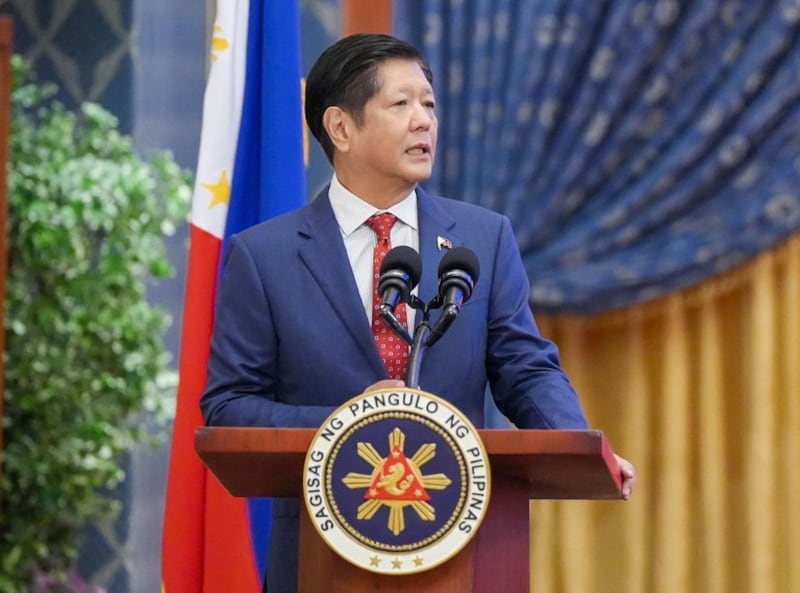Beijing’s new threat of detaining fishermen in South China Sea waters it considers its own marks an escalation in maritime tensions, Philippine President Ferdinand Marcos Jr. said Wednesday.
He was commenting in public for the first time on the Chinese coast guard’s newly issued orders that call for the maritime force to detain foreign vessels and crew suspected of trespassing into Beijing-claimed waters in the disputed waterway.
The order is to take effect June 15. China earlier this month began enforcing an annual four-month fishing ban in the contested waters.
"The new policy of threatening to detain our own citizens, that is different. That is an escalation of the situation. So, yes, it is now very worrisome," Marcos told reporters, according to a statement released by his communications office.
Marcos was speaking in Brunei, where he wrapped up a state visit before going to Singapore, where he is scheduled to give a keynote speech on Friday at the Shangri-La Dialogue, a high-level international security conference.
Marcos is expected to highlight the South China Sea during his speech in Singapore. Top political and security leaders from dozens of countries, including from rival superpowers the United States and China, are expected to attend the Shangri-La meetings.
'Illegal' order
On May 15, the Chinese coast guard issued an order authorizing its personnel to detain for up to 30 days — and 60 days, in some cases — foreign boats and nationals suspected of trespassing in South China Sea waters claimed by Beijing.
Manila hit back days later, calling the order “illegal” and warning against repercussions if it was implemented.
The Philippines has also formally protested this year's fishing ban by China.
The four-month fishing moratorium began on May 1 and is to last until Sept. 16 in areas in the South China Sea that are "north of the 12 degrees North latitude." That includes waters considered to be part of Manila's exclusive economic zone.
Filipino fishermen have threatened to defy the detention order, and the Philippine Coast Guard said it was ready to aid them in case they were harassed.

China said the new policy aims to standardize law enforcement and better uphold maritime order.
"It is consistent with universal practices. Individuals and entities have no need for concern as long as they have not done anything illicit," Chinese foreign ministry spokeswoman Mao Ning said during a regular press conference on Wednesday.
“[It] is the Philippines, not China, that has escalated the situation and made repeated provocations in the South China Sea,” she told reporters.
“China’s door of dialogue and communication with the Philippines remains open, but it’s important to note that dialogue requires sincerity and whatever is agreed in dialogue must be acted upon, rather than talking about the need for dialogue while continuing to make provocations.”
Back-channel efforts
In Brunei, Marcos said Manila was pursuing back-channel efforts with China to try and cool down bilateral tensions over the waterway, especially in Scarborough Shoal and Second Thomas Shoal, also known as the Ayungin Shoal, which both countries claim.
The shoals lie within Manila’s exclusive economic zone, but Beijing lately has been intercepting Filipino boats trying to reach waters around them.
“You should try everything. You don’t know what effort is going to be successful,” Marcos said.
“So, [at] any point of contact that I can establish, I will use it, and at every level — at the leaders’ level, at the ministerial, sub-ministerial, private [levels] — as long as it gives us, brings us progress in terms of resolving these [territorial problems],” he said.
“And if we can get to that, then we can move to the next step and to see if there is a way to resolve all these claims, and so that we can all go about our business in a peaceful way and continue to try and develop our countries,” he said. “There are always, always efforts at every level.”
The Philippines, China, Malaysia, Brunei and Vietnam as well as Taiwan have competing claims in the South China Sea.
‘A significant recalibration’
Marcos’ upcoming speech in Singapore reflects how the international community is keeping a close eye on the South China Sea, considered a geopolitical flashpoint, according to an expert based in Manila.
Many countries are watching the Philippines because “the country is undergoing a significant recalibration of its foreign and security policy,” geopolitical analyst Don McLain Gill told BenarNews.
“Manila intends to play an active role in securing the established order in the Indo-Pacific through securing its sovereignty and sovereign rights based on international law,” he said.
But while it would significantly increase Marcos’ profile, his speech is unlikely to be “a game changer for China’s policy trajectory towards Manila,” Gill said.
China claims historical rights over most of the South China Sea, although a landmark international arbitration ruling in 2016, in a case brought by Manila against Beijing, rejected those claims entirely.
Jeoffrey Maitem contributed to this report from Manila.
